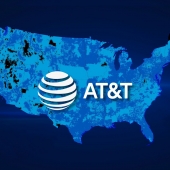-
Cyberattack on UK’s CVS Group disrupts veterinary operations
UK veterinary services provider CVS Group has announced that it suffered a cyberattack that disrupted IT services at its practices across the country.
- April 08, 2024
- 10:45 AM
-
 0
0
-
Over 92,000 exposed D-Link NAS devices have a backdoor account
A threat researcher has disclosed a new arbitrary command injection and hardcoded backdoor flaw in multiple end-of-life D-Link Network Attached Storage (NAS) device models.
- April 06, 2024
- 10:16 AM
-
 0
0
-
New Ivanti RCE flaw may impact 16,000 exposed VPN gateways
Approximately 16,500 Ivanti Connect Secure and Poly Secure gateways exposed on the internet are likely vulnerable to a remote code execution (RCE) flaw the vendor addressed earlier this week.
- April 05, 2024
- 01:40 PM
-
 0
0
-
Fake Facebook MidJourney AI page promoted malware to 1.2 million people
Hackers are using Facebook advertisements and hijacked pages to promote fake Artificial Intelligence services, such as MidJourney, OpenAI's SORA and ChatGPT-5, and DALL-E, to infect unsuspecting users with password-stealing malware.
- April 05, 2024
- 12:47 PM
-
 0
0
-
New Latrodectus malware replaces IcedID in network breaches
A relatively new malware called Latrodectus is believed to be an evolution of the IcedID loader, seen in malicious email campaigns since November 2023.
- April 04, 2024
- 04:38 PM
-
 0
0
-
Visa warns of new JSOutProx malware variant targeting financial orgs
Visa is warning about a spike in detections for a new version of the JsOutProx malware targeting financial institutions and their customers.
- April 04, 2024
- 03:29 PM
-
 0
0
-
US cancer center data breach exposes info of 827,000 patients
Cancer treatment and research center City of Hope is warning that a data breach exposed the sensitive information of over 820,000 patients.
- April 04, 2024
- 12:57 PM
-
 0
0
-
New HTTP/2 DoS attack can crash web servers with a single connection
Newly discovered HTTP/2 protocol vulnerabilities called "CONTINUATION Flood" can lead to denial of service (DoS) attacks, crashing web servers with a single TCP connection in some implementations.
- April 04, 2024
- 11:28 AM
-
 0
0
-
SurveyLama data breach exposes info of 4.4 million users
Data breach alerting service Have I Been Pwned (HIBP) warns that SurveyLama suffered a data breach in February 2024, which exposed the sensitive data of 4.4 million users.
- April 03, 2024
- 06:28 PM
-
 3
3
-
Critical flaw in LayerSlider WordPress plugin impacts 1 million sites
A premium WordPress plugin named LayerSlider, used in over one million sites, is vulnerable to unauthenticated SQL injection, requiring admins to prioritize applying security updates for the plugin.
- April 03, 2024
- 02:21 PM
-
 3
3
-
AT&T faces lawsuits over data breach affecting 73 million customers
AT&T is facing multiple class-action lawsuits following the company's admission to a massive data breach that exposed the sensitive data of 73 million current and former customers.
- April 03, 2024
- 12:28 PM
-
 1
1
-
Google fixes two Pixel zero-day flaws exploited by forensics firms
Google has fixed two Google Pixel zero-days exploited by forensic firms to unlock phones without a PIN and gain access to the data stored within them.
- April 03, 2024
- 10:47 AM
-
 6
6
-
Winnti's new UNAPIMON tool hides malware from security software
The Chinese 'Winnti' hacking group was found using a previously undocumented malware called UNAPIMON to let malicous processes run without being detected.
- April 02, 2024
- 05:59 PM
-
 0
0
-
Google agrees to delete Chrome browsing data of 136 million users
Google has agreed to delete billions of data records collected from 136 million Chrome users in the United States, as part of a lawsuit settlement regarding alleged undisclosed browser data collection while in Incognito mode.
- April 02, 2024
- 01:07 PM
-
 0
0
-
Russia charges suspects behind theft of 160,000 credit cards
Russia's Prosecutor General's Office has announced the indictment of six suspected "hacking group" members for using malware to steal credit card and payment information from foreign online stores.
- April 02, 2024
- 11:37 AM
-
 4
4














